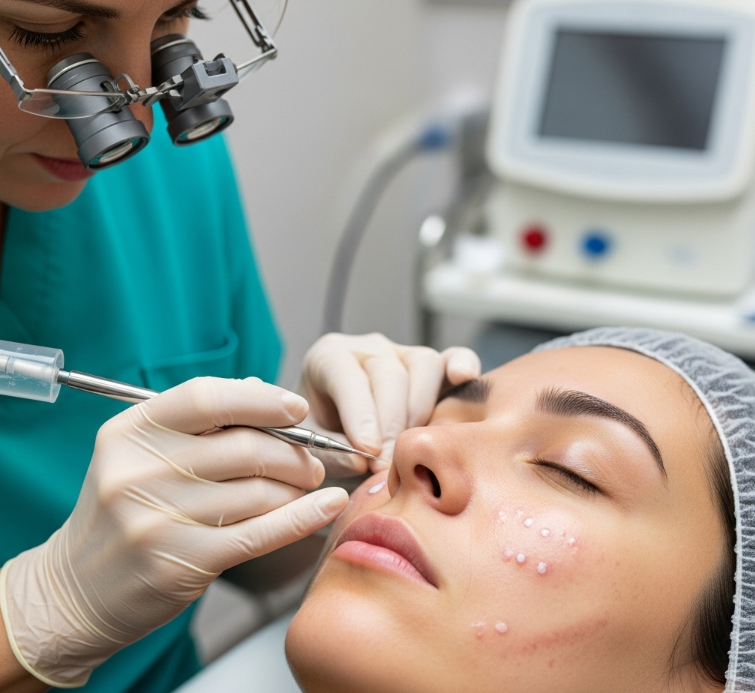Treatment Overview
TCA CROSS (Chemical Reconstruction of Skin Scars) is a specialized dermatology technique that uses high-concentration trichloroacetic acid (TCA) applied directly into ice-pick and narrow boxcar scars.
The acid causes controlled chemical injury inside the scar, stimulating collagen production and dermal remodeling as the skin heals. Unlike chemical peels that treat the entire surface, TCA CROSS targets only the scar tissue, making it a precise treatment for deep, stubborn scars.
In Korea, TCA CROSS is often combined with subcision, CO₂ fractional laser, microneedling RF, or PRP for a comprehensive acne scar repair protocol.
Purpose & Benefits
- Scar Remodeling: Stimulates collagen to fill in deep ice-pick and narrow scars.
- Targeted Approach: Treats individual scars without affecting healthy skin.
- Permanent Improvement: Results build up over multiple sessions.
- Minimal Equipment Required: Simple yet effective treatment performed by dermatologists.
- Synergy: Works well alongside lasers or regenerative injectables.
Ideal Candidates
TCA CROSS in Korea for acne scars is recommended for:
- Patients with ice-pick scars or deep, narrow boxcar scars.
- Individuals who did not improve enough with lasers or microneedling.
- Adults seeking a precise, targeted option for difficult scars.
- Those open to multiple treatment sessions for best results.
Comparison with Other Treatments:
- TCA CROSS: Best for ice-pick scars and narrow, deep pits.
- Punch Excision: Best for single, very deep scars (surgical removal).
- CO₂ Fractional Laser: Best for overall scar texture and multiple scar types.
- Subcision + Fillers: Best for rolling/tethered scars.
- Fraxel Dual: Best for mild scarring with pigmentation.
Possible Risks & Complications
When performed in Korean dermatology clinics, TCA CROSS is safe. Potential risks include:
- Redness & Scabbing: Common, lasts 5–10 days.
- Temporary PIH (Post-Inflammatory Hyperpigmentation): More common in Asian skin but minimized with conservative Korean protocols and sun protection.
- Over-Treatment (rare): May lead to wider scars if applied incorrectly—why expert care is essential.
Treatment Techniques Used
- Spot Application: High-strength TCA (70–100%) applied into scar base with a fine applicator.
- Controlled Injury: Causes immediate frosting, leading to new collagen as it heals.
- Multiple Sessions: Typically 3–6 sessions, spaced 4–6 weeks apart.
- Combination Protocols: Often followed by CO₂ laser, PRP, or skin boosters for enhanced results.
Recovery & Aftercare
- Immediately: White “frosting” appears on treated scars, fading to redness.
- 3–7 Days: Scabs form and fall off naturally.
- 1–2 Weeks: Treated scars begin to flatten and fade.
- 2–3 Months: Progressive collagen remodeling fills in pits.
Aftercare Tips:
- Do not pick or scratch scabs.
- Apply soothing ointments as prescribed.
- Avoid harsh skincare for 1 week.
- Use SPF 50+ sunscreen daily to prevent pigmentation.
- Stay consistent with multiple sessions for best results.
Results & Longevity
- Short-Term (1 Session): Some softening of scars, but subtle.
- Medium-Term (3–4 Sessions): Noticeable reduction in ice-pick scars.
- Long-Term (6+ Months): Permanent improvement in scar depth with continued collagen remodeling.
Treatment Process in Korea
- Consultation & Scar Analysis – Dermatologist identifies scars suitable for TCA CROSS.
- Preparation – Skin cleansed; numbing cream may be applied.
- TCA Application – Acid applied directly to scars with fine tip.
- Healing Phase – Redness → scabbing → regeneration cycle.
- Optional Add-Ons – CO₂ laser, microneedling RF, PRP, or Rejuran.
- Follow-Up – Sessions repeated monthly until scars improve.
Why Korea is a Top Destination
- Korean dermatologists are experts at acne scar combination treatments, using TCA CROSS as a precise add-on.
- Clinics follow low-irritation protocols tailored for Asian skin to minimize PIH.
- Treatments often integrated into multi-step scar repair packages (TCA CROSS + laser + PRP).
- More affordable compared to Western clinics, with flexible package pricing.
- Seoul is renowned for advanced scar remodeling strategies combining surgical, laser, and regenerative approaches.
Cost Range (Detailed Breakdown)
Pricing for TCA CROSS in Korea for acne scars:
- Single Session (few scars): USD 80 – 150
- Full-Face Session (multiple scars): USD 200 – 400
- 3-Session Package: USD 500 – 900
- Premium Scar Package (TCA CROSS + CO₂ Laser + PRP/Rejuran): USD 1,500 – 3,000 (3–5 sessions)
Additional Costs in Korea:
- Consultation: USD 20 – 40
- Add-ons (PRP, Rejuran, Exosomes, Microneedling RF): USD 150 – 600
💡 Many patients call TCA CROSS the “scar spot treatment”, since it directly targets stubborn ice-pick scars that lasers alone cannot fix.
Popular Clinics in Seoul
- Banobagi Dermatology – TCA CROSS + CO₂ laser packages for deep scars.
- Oracle Dermatology – TCA CROSS combined with PRP or exosome healing.
- Renewme Skin Clinic – TCA CROSS with microneedling RF for scar remodeling.
- View Plastic & Dermatology – TCA CROSS + subcision + regenerative boosters.
- Chaum Anti-Aging Center – Luxury scar programs with TCA CROSS + multi-step regeneration.




